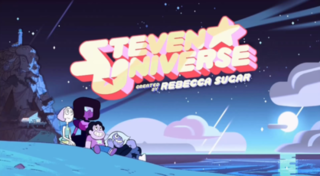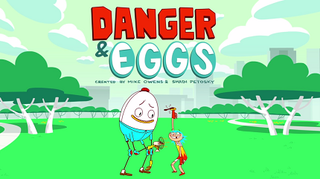
LGBT representation in children's television is representation of LGBT topics, themes, and people in television programming meant for children. LGBT representation in children's programming was often uncommon to non-existent for much of television's history up to the 2010s, but has significantly increased since then.
Historically, the portrayal of lesbian, gay, bisexual, transgender and queer (LGBTQ) people in media has been largely negative if not altogether absent, reflecting a general cultural intolerance of LGBTQ individuals; however, from the 1990s to present day, there has been an increase in the positive depictions of LGBTQ people, issues, and concerns within mainstream media in North America. The LGBTQ communities have taken an increasingly proactive stand in defining their own culture, with a primary goal of achieving an affirmative visibility in mainstream media. The positive portrayal or increased presence of the LGBTQ communities in media has served to increase acceptance and support for LGBT communities, establish LGBTQ communities as a norm, and provide information on the topic.

Steven Universe is an American animated television series created by Rebecca Sugar for Cartoon Network. It tells the coming-of-age story of a young boy, Steven Universe, who lives with the Crystal Gems—magical, mineral-based aliens named Garnet (Estelle), Amethyst and Pearl —in the fictional town of Beach City. Steven, who is half-Gem, has adventures with his friends and helps the Gems protect the world from their own kind. The television pilot was first shown in May 2013, and the series ran for five seasons, from November 2013 to January 2019. The television film Steven Universe: The Movie was released in September 2019, and an epilogue limited series, Steven Universe Future, ran from December 2019 to March 2020. Books, comics, video games and soundtracks based on the series have been released.

Rebecca Rea Sugar is an American animator, screenwriter, producer, director, and musician. She is best known for being the creator of the Cartoon Network series Steven Universe, making her the first non-binary person to independently create a series for the network; prior to coming out as non-binary, Sugar was described as the first woman to do so. Until 2013, Sugar was a writer and storyboard artist on the animated television series Adventure Time. Her work on the two series has earned her seven Primetime Emmy Award nominations. Sugar is bisexual, non-binary, and genderqueer, using both she/her and they/them pronouns. Sugar's queerness has served as the inspiration for her to stress the importance of LGBT representation in the arts, especially in children's entertainment.

The portrayals of bisexuality in the media reflect societal attitudes towards bisexuality in the existing media portrayals. Throughout history, numerous bisexual characters have appeared in television series, including cartoons, anime, video games and web series, along with literature, comics, radio, and other mediums.

OK K.O.! Let's Be Heroes is an American animated television series created by Ian Jones-Quartey for Cartoon Network. The show is based on Jones-Quartey's pilot Lakewood Plaza Turbo, which was released as part of Cartoon Network's 2013 Summer Shorts project. It was produced by Cartoon Network Studios. The web series premiered on Cartoon Network's YouTube channel and on Cartoon Network Video on February 4, 2016. On March 9, 2017, nearly 4 years after the original short's premiere, Cartoon Network announced that the television series had been greenlit, and it premiered on August 1, 2017. The opening sequence was storyboarded by Japanese artist Hiroyuki Imaishi, co-founder of Studio Trigger.

Danger & Eggs is an American animated series created by Mike Owens and Shadi Petosky that premiered on Amazon Video on June 30, 2017. The show focuses on the adventures of a cyan-haired teenaged girl and her giant anthropomorphic egg friend.

Craig of the Creek is an American animated television series created by Matt Burnett and Ben Levin for Cartoon Network. The show's pilot episode debuted directly on the TV on December 1, 2017. The series premiered online on February 19, 2018, with a double-premiere event airing on March 30, 2018.

She-Ra and the Princesses of Power is an American animated television series developed for Netflix by ND Stevenson and produced by DreamWorks Animation Television. Like the 1985 Filmation series She-Ra: Princess of Power, of which it is a reboot, She-Ra and the Princesses of Power tells the tale of Adora, an adolescent who can transform into the heroine She-Ra and leads a group of other magical princesses in a rebellion against the evil Lord Hordak and his Horde.

Twelve Forever is an American animated television series created by Julia Vickerman for Netflix. Vickerman had previously worked on Clarence and The Powerpuff Girls. Twelve Forever premiered in the United States on July 29, 2019.
In the United States, before the enforcement of the Hays Code, some cartoon shorts contained humor that was aimed at adult audience members rather than children. Following the introduction of the Motion Picture Association of America film rating system, independent animation producers attempted to establish an alternative to mainstream animation. Initially, few animation studios in the United States attempted to produce animation for adult audiences, but later examples of animation produced for adults would gain mainstream attention and success. Some of the most prominent animations with these mature/adult themes include Aqua Teen Hunger Force, BoJack Horseman, South Park, Family Guy, Mission Hill, and Archer, along with other adult animated television series, feature films, and animation in other forms which helped the genre expand over the years, beyond animated sitcoms.
Netflix has contributed substantially to LGBTQ representation in animation. Lesbian, gay, bisexual, pansexual, asexual and transgender characters have appeared in various animated series, and some animated films, on the streaming platform. GLAAD described Netflix as a company taking "impressive strides in viewership and impact," when it came to LGBTQ representation. Scholars have stated that LGBTQ characters on streaming services, such as Netflix, "made more displays of affection" than on broadcast networks.
This article features the history of the representation of lesbian, gay, bisexual, transgender and queer (LGBTQ) characters in animated productions under The Walt Disney Company, including films from the studios Walt Disney Animation Studios and Pixar, and programming from the Disney Branded Television channels as well as the streaming service Disney+. From 1983 onward, Disney struggled with LGBTQ representation in their animated series, and their content often included LGBTQ stereotypes or the content was censored in series which aired on Toon Disney such as Blazing Dragons. Some creators have also criticized Disney studio executives of cutting LGBTQ scenes from their shows in the past, or criticized that their shows were not seen as part of the "Disney brand", like The Owl House.
In Western animation, LGBTQ themes means plotlines and characters which are lesbian, gay, bisexual, transgender, or otherwise queer in series, produced in Western countries, and not in Japan, which can also have similar themes. Early examples included Bugs Bunny in drag, wearing a wig and a dress, as a form of comedy, or episodes of Tom & Jerry, under restrictive moral guidelines like the Hays Code with some arguing that animation has "always had a history of queerness." This later evolved into gay-coded characters in Disney films like Beauty and the Beast and The Little Mermaid, and in animated series such as The Simpsons and South Park. In later years, other series would more prominently depict same-sex characters and relationships. This would include Adventure Time, Steven Universe, The Legend of Korra, Gravity Falls, Clarence, The Loud House, and Arthur. Such series, and others, have encountered roadblocks, with series creators attempting to make their programs "more welcoming of different characters," and ensure all-ages animation is no longer "bereft of queer characters." Previously, an online database, by Insider, documented over 250 LGBTQ characters in children's animation dating back to 1983, but the "representation of overtly queer characters" skyrocketed from 2010 to 2020, with promotion of these series by some streaming platforms, while other companies were not supportive of overt representation, for one reason or another.

Nickelodeon, an American TV channel which launched in 1979, has featured lesbian, gay, bisexual and transgender (LGBT) characters in its programming.










